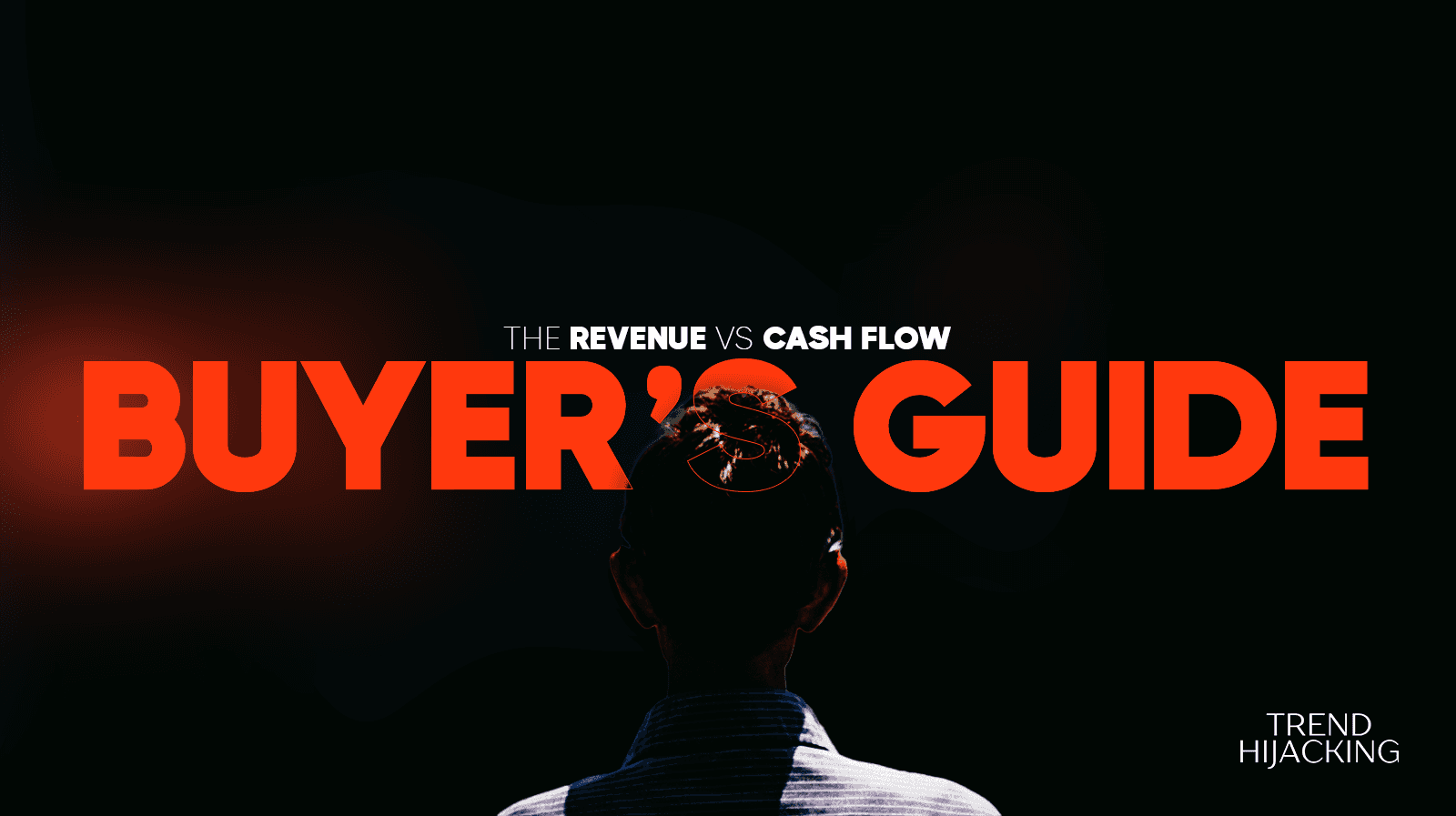The Future of Buying Online Businesses (A Broker's Predictions)
Valuation Trends (What Buyers Will Pay)

One of the first questions you will ask yourself when buying an existing online business is how much it is worth. And brokers see clear trends in how valuations are shifting.
In the past few years, valuations jumped as more people wanted to buy. For example, SaaS companies were selling for 7× revenue at one point.
Today, that has cooled, and they average around 6× to 7× revenue in early 2025 (Source). Buyers are still paying strong prices, but they’re more careful about what they buy.
Size matters too.
A store or blog making $50,000 a year might only sell for 2.5× or 3× profit. But a business with $500,000 in profit can reach 4× or more because bigger operations look more stable (Source).
Brokers also note that buyers want businesses that aren’t tied to one income source. If all the money comes from one ad network or one supplier, they’re likely to hesitate. In other words, more income streams mean more trust in the deal, and that shows up in the price.
Recommended: 20+ Must-Know Terms Before You Buy An Online Business
We Help You Buy / Build, Manage and Scale E-commerce Brands for an EXIT
E-commerce Simplified for Busy Individuals – We handle the buying, building, and scaling, so you can focus on what matters.
Growth-Focused Strategies – From sourcing to marketing, we drive growth and prepare you for a profitable exit.
Expertly Managed Exits – We build a high-value brand designed for a Lucrative exit.
Technology & Tools Shaping Deals

It goes without saying that technology is massively transforming how buyers look at businesses.
For instance, AI tools are now helping with due diligence, the research process where buyers check if numbers are real. These tools can quickly scan traffic, customer behavior, and ad spend to flag risks. This saves you time and helps you avoid costly mistakes in acquisitions.
Platforms like Empire Flippers, Flippa, and FE International are also tightening their rules. Sellers must now show verified financials, traffic proof, and supplier details. This makes deals more transparent, which is good for buyers.
Buyers also prefer businesses with automated systems. If inventory, fulfillment, and customer service run smoothly with little manual effort, the business looks less risky. Automation is no longer a bonus; it’s becoming an essential!
Niches and Opportunities

Not every type of online business attracts the same level of buyer interest. Brokers say some models are heating up more than others.
The hottest business models right now include:
SaaS and Subscriptions: This includes businesses that sell software or run on subscriptions. They have recurring revenue, lower costs, and steady growth potential. Buyers prefer such businesses as they don’t have to rebuild sales each month.
Niche E-Commerce Stores: Micro-brands that serve specific groups—like eco-friendly products or pet supplies—are also attractive to many buyers. These businesses usually boast a loyal community plus strong reviews, which make them stand out.
Global Reach: Yes, businesses that already sell across countries are gaining more interest among buyers. With e-commerce sales worldwide projected to hit $7.4 trillion by 2025, the ability to serve global customers becomes a big plus.
Social Commerce: Stores tied to platforms like TikTok, Instagram, or YouTube are also rising in demand. If a brand has a big following that directly fuels sales, buyers see it as a growth engine.
Risks Buyers Need To Watch Out For

If you’re a beginner in the business acquisition space, one thing you need to keep in mind is that buying online businesses isn’t all upside.
Brokers warn about the following risks that keep showing up in acquisitions:
Heavy Competition: Niches that once felt wide open now have many players. As a buyer, you must check how crowded a space is before jumping in.
Dependency: Relying on one supplier, one traffic source, or one platform (like Amazon) is risky. It takes only a single rule change or price increase to hit your profits overnight.
Regulation: Data privacy, taxes, shipping laws, and payment rules are becoming stricter. If a seller hasn’t followed the rules, you could inherit legal or financial problems (not good for your investment).
Shaky Valuations: Valuations may drop if economic conditions change. Interest rates, inflation, or weaker consumer spending can all cut into what buyers are willing to pay. Brokers expect prices to settle into a more balanced range instead of constant growth.
How Deals Themselves Are Changing

Brokers also notice that the way deals are structured is evolving, with buyers and sellers finding new ways to share risk, secure smoother transitions, and make payments more flexible.
Here’s how deals are changing:
Earn-outs and Payment Plans: Instead of buyers paying all at once, more deals use earn-outs. That means the seller only gets the full amount if the business keeps hitting targets after the sale. This reduces risk for the buyer.
Seller Involvement After the Sale: Buyers often ask sellers to stay on for a few months to train the new owner. This makes the handoff smoother and helps protect the investment.
More Financing: Because bigger businesses are in play, more buyers are using loans, investors, or partnerships. This brings in more professional money, which means stricter reporting and cleaner financials are needed.
We Help You Buy / Build, Manage and Scale E-commerce Brands for an EXIT
E-commerce Simplified for Busy Individuals – We handle the buying, building, and scaling, so you can focus on what matters.
Growth-Focused Strategies – From sourcing to marketing, we drive growth and prepare you for a profitable exit.
Expertly Managed Exits – We build a high-value brand designed for a Lucrative exit.
The Bigger Picture In Buying Online Businesses

The future of buying online businesses ties into a growing market.
In the U.S. alone, e-commerce sales in Q2 2025 hit $304.2 billion, making up 16.3% of all retail sales (U.S. Census Bureau, 2025).
Globally, e-commerce will keep climbing, and buyers want a piece of that growth.
This backdrop explains why more people are looking to buy instead of build.
It’s faster, and it taps into a proven model rather than starting from zero.
Conclusion
Buying online businesses is set to grow, but it will also get tougher. Multiples won’t skyrocket like before, but stable, diverse businesses will still earn strong prices. Buyers will rely more on AI, automation, and strict due diligence. Some business models, like subscription, niche e-commerce, and global brands, look more attractive. Risks around competition, dependency, and regulation are real, so buyers need clear eyes going in.
If you’re thinking about buying, we advise you to focus on businesses with proven income streams, automation in place, and room to grow. And we can help you find just that in as little as 60 days! With our Smart Acquisition Services, we handle due diligence, negotiations, and closing on your behalf, ensuring you acquire a profitable online business that you can grow and later exit at a premium profit.
Thinking about buying an online business? Don’t guess; take our 3-minute quiz now to see if you’re really ready.
A Done-For-You E-commerce Business
Discover how we Build, Launch, and Scale a 6-figure/month Business for You
Learn more
The 6-Step Blueprint to E-Commerce Acquisition
See how we Acquire, Convert, and Scale with Real Case Studies to Prove It.




















